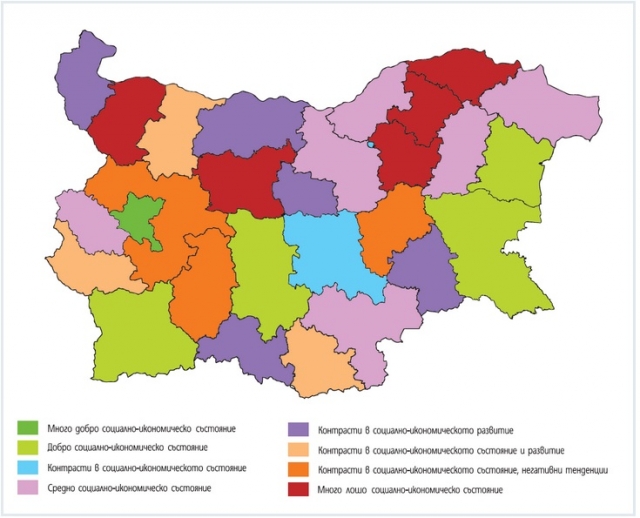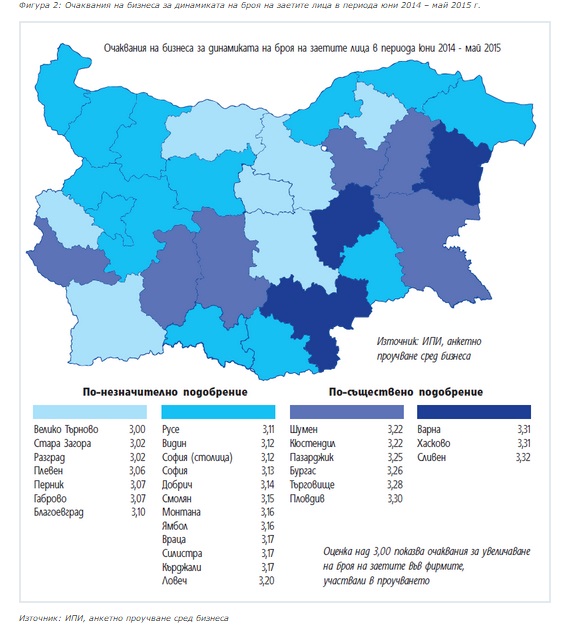Charts - Institute for Market Economics
Polina Spartyanova
Southern Bulgaria is continuing the trend of rapid recovery of the socio-economic condition to the pre-crisis levels that has been observed over the past three years, whereas in the northern part employment remains alarmingly low, continuing to suppress the incomes and living standards. These are the conclusions of the survey "Regional Profiles: Development Indicators " by the Institute for Market Economics (IME), which for the third consecutive year has drawn up the actual socio-economic profiles of the 28 regions of Bulgaria. According to the typology of the regions and their socio-economic state, only Sofia is in a "very good socio-economic state" and Blagoevgrad, Burgas, Varna and Plovdiv in ''a good state", the economies of the present leaders being the most developed in Bulgaria.

The socio-economic state of Razgrad, Silistra, Targovishte, Lovech and Montana regions is defined as "very poor", due to the high levels of unemployment and low employment recorded there. According to the analysis, the spiral of low employment-stagnant income-declining population is the basis of the ongoing socio-economic divergence between the capital Sofia and the rest of the country whereas the scope of the profiles of the regions with negative trends remains much wider compared to the regions with good trends. "The regional policy in Bulgaria is not working - no economic and social cohesion between the regions is observed," says Dr. Alexander Tsvetkov from "Regiostat", who is part of the team of analysts.
Although southwest Bulgaria is reporting a trend towards recovery, employment in the region of Sofia (the capital) is draining the jobs and labourforces of the countryside. This is one reason why the capital is best developed as an economic region of the country and its economy is twice as large as that of the region of Sofia, which is second in the rankings. The regions of Kyustendil, Shumen, Razgrad, Sliven, Silistra, Montana and Vidin, which has the status of the poorest region in the European Union, have the lowest rating. The study of regional policies shows that the economic recovery, which has started, continues to be hampered by the political instability in the central government and the relative passivity of the local government bodies regarding the local business conditions.

According to the study "Regional Profiles: Development Indicators 2014", the situation of the labour market in the majority of the regions of Bulgaria is improving despite the political instability that has been apparent since the spring of 2013 to the present day. The observations of IME regarding the workforce and business expectations for the dynamics of the number of employees in the period June 2014 - May 2015 confirm the trend of rapid recovery of southern Bulgaria and stagnation in northern that was indicated in last year's study. Despite the expected improvement of the southern regions of Bulgaria, some northern regions such as Varna, Dobrich and Gabrovo have reported increased economic activity and employment rate since the beginning of the year. According to experts from IME, it is quite possible for employment rates in some areas to reach and even surpass the pre-crisis levels in 2014 and 2015. In their view, the recovery of the labour market in Bulgaria and its regions is taking place not due to the policies conducted at the national and local levels, but in spite of them.
The economists at IME share the opinion that the finances of Bulgarian municipalities are in a "vicious circle" in which the allocation of funds to the regions is carried out on a political principle, as the local representation is largely dependent on the centralized management of funds and undermined by the fiscal policy of each government. According to Petar Ganev, it is empirically proven that the dependence of municipalities on the executive power harms the development of the regions, as the centralized management of financial resources leads to their allocation to economic enterprises that are close to politicians. Because of this, investments in the regions have decreased due to the uncertain business environment, leading to the suspension of funds from the European Union because of abuse at the central level.
The study by IME offers solutions to these problems. According to the economists, firstly the necessary changes in the Bulgarian financial system must be carried out which will automatically redirect 1/5 of the revenue from the income tax to the local budgets. Their idea is to introduce the principle that "money follows the ID card," according to which the taxpayer's money will go to the place of registration indicated in the ID card. "I think it is a very positive factor to offer people the choice of where their money should go to," says economist Peter Ganev.